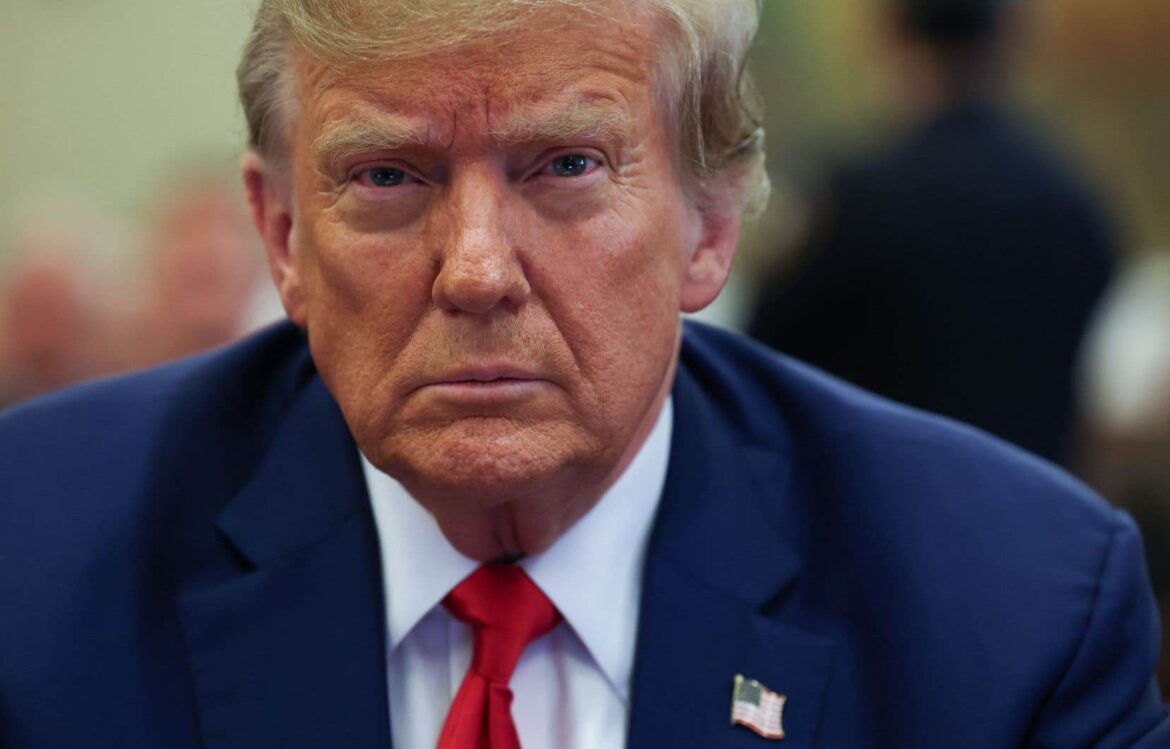At the end of a highly publicized trial which lasted nearly two and a half months, Judge Arthur Engoron on Friday severely sentenced former President Donald Trump to pay a fine of 355 million US dollars for conspiracy to to manipulate the accounts of his real estate empire.
In the process, the judge imposed a ban on the billionaire from holding a position in a New York company for a period of three years. That includes his own. The same sanction also applies for two years to the former president’s two sons, Donald Trump Jr. and Eric Trump. The latter is the CEO of the Trump Organization.
The judgment therefore compromises the ability of a member of the Trump family to run the company in the short term.
On Wednesday, on his social network, the ex-president had anticipated this verdict by protesting in advance, in capital letters, at a “dishonest judgment” which will mark a “dark and sad day for the justice system of the New York State.”
This conviction could in fact have “seismic consequences” on Donald Trump’s empire, Elliot Williams, former federal prosecutor and analyst on the CNN network, indicated a few weeks ago, referring to the “loss for the organization of any significant capacity to do business in New York”, a sanction far more damaging “than a prison sentence”, according to him.
New York justice has launched civil proceedings against the ex-president and leader in the current race for the Republican nomination, accusing him of having for years inflated the value of the assets of his real estate empire in a manner to obtain more generous loans or lower rates from banks and insurance companies. The trial which began last October also targets two former executives of the Trump Organization, Allen Weisselberg and Jeff McConney.
In total, nearly 200 financial evaluations were scrutinized. The example of Mar-a-Lago, in Florida, the iconic residence of the populist, is also glaring: the courts value the property at 18 million dollars, while Trump’s real estate division speaks of it as a jewel worth half a billion, or 25 times more. Last September, at the opening of the trial, the ex-president, angry, even pushed the overvaluation of this property even further on his social network, citing an amount of 1.8 billion, a hundred times more than the assessment made by the courts.
New York State prosecutors were seeking $370 million in restitution for ill-gotten gains.
In his judgment, Arthur Engoron considers that “the accused did not agree to assume their responsibility” nor to impose “internal controls to prevent future recurrences”, we can read.
An imaginary world
Last September, the judge held the ex-president responsible for fraud by describing as “convincing” the evidence which established the “imaginary (financial) world” constructed by Donald Trump, on purpose. Between 2014 and 2021, he overvalued the assets of his group by “812 million to 2.2 billion dollars” depending on the year.
The judge also ordered the billionaire’s business licenses to be revoked at that time, preventing him from continuing any part of his real estate business in New York State. Donald Trump appealed this decision. It should also place this new verdict from Judge Engoron on the same trajectory.
The judgment in this case was initially due to be delivered on January 31, but the decision was delayed after the emergence of new elements that could influence the verdict. In a letter submitted to the court late last month, a court-appointed monitor to oversee the Trump Organization’s financial reporting said a $48 million personal loan reported for years as a liability in the financial statements of the ex-president and coming from a company linked to one of his buildings in Chicago had ultimately “never existed”.
In early February, the former financial director of Trump’s real estate empire and co-defendant in this case, Allen Weisselberg, also reportedly entered into talks with the Manhattan district attorney’s office to sign an agreement in which he admits his guilt, a reported on New York Times last week. This could have had an impact on this affair, but also on other trials that the Republican candidate will have to face, on the sidelines of the electoral campaign that he is currently leading in the hope of regaining the White House next November. .
Repeated hard blows
Judge Engoron’s decision concludes a busy legal week for Donald Trump, who has been notified in person to appear in another New York court on March 25 for the start of his criminal trial for bribery. -wine. The payments were aimed at hushing up an alleged relationship with pornographic actress Stormy Daniels in the final weeks of her 2016 election campaign.
Since the beginning of the year, American justice has dealt hard blows to the ex-president, who received an exemplary fine of 83 million US dollars at the end of January in the defamation suit brought against him by the journalist and author E. Jean Carroll.
In total, the populist also faces 91 counts in four separate criminal cases, including one for trying to overturn the 2020 presidential vote in his favor, by, among other things, orchestrating an insurrection against the Capitol on January 6, 2021 , and another for seeking to create fake Republican voters in Georgia to prevent Joe Biden’s victory that same year.
As of October 2023, the estimated net worth of the Trump empire is $2.6 billion, according to the magazine Forbesincluding $426 million in cash and liquid assets.
With this latest ruling, Donald Trump could have to pay more than $400 million, once interest is added, a penalty that, combined with that handed down in the civil suit filed by E. Jean Carroll for defamation, would wipe out the Trump’s cash flow. Republican and would decrease the overall value of his real estate empire by 15%, according to Bloomberg.



